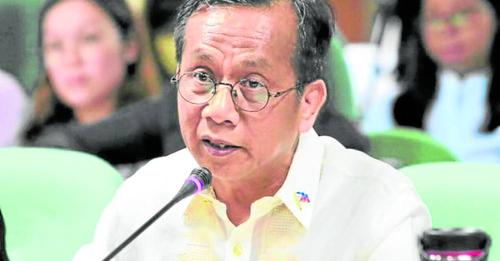
File photo
MANILA, Philippines —Socioeconomic Planning Secretary Arsenio Balisacan on Saturday reiterated his support for the proposed amendments particularly to the restrictive economic provisions of the Constitution.
Those changes, the National Economic and Development Authority (Neda) chief said in a statement, are crucial for the economic advancement and competitiveness of the Philippines.
Balisacan issued the statement to clarify an earlier report on his views about the ongoing discussions related to Charter change which, he said, was “misinterpreted” as expression of concern about “discord” between the legislative chambers.
“My stance has consistently been one of strong support for the proposed amendments to the restrictive economic provisions of our Constitution,” the Neda chief said in a statement.
“It is necessary to address and remove these restrictions, but it is also important to note that apart from eliminating those barriers, it is imperative to address the ease of doing business, high-cost of certain inputs like energy, and the predictability of our policies, regulatory or otherwise,” he said.
“Removing the restrictive economic provisions will provide a more fertile ground for both local and foreign investments, thereby fostering greater economic growth and development,” Neda’s Balisacan added.
Investment-friendly environment
President Marcos himself said he would study the latest attempt at the House of Representatives led by his cousin, Speaker Martin Romualdez, to revise the Constitution for the purpose of making the Philippines “an investment friendly place.”
There were moves during the previous administration to relax the protectionist provisions of the Constitution. However, those attempts failed amid fears that the sitting administration was trying to perpetuate itself in power.
But before leaving Malacañang, former President Rodrigo Duterte enacted two key reforms meant to open up the economy to more foreign investments.
The first one was the Retail Trade Liberalization Act that sought to simplify and ease restrictions for foreign retailers that wish to set up shop in the Philippines. The other was amendments to the Commonwealth-era Public Service Act, which opened industries once deemed off-limits to foreign capital—such as telecommunications, airlines and railways—to full foreign ownership.
Policy reforms
For the Neda chief, there are several policy reforms needed to get the full benefits of removing the economic restrictions in the constitution.
These changes, he said, are “essential in making our nation more attractive to foreign investments and more adaptable in the global economic landscape.”
Balisacan also stressed that while he is supportive of these amendments, there’s also a need for a “balanced approach” that includes maintaining certain protections, such as the stance against full foreign ownership of land.
“I commend the ongoing efforts of both the Senate and the House of Representatives in addressing these constitutional amendments,” the Neda chief said.
“I believe these discussions are being conducted with the nation’s best interests in mind and with a shared goal of economic progress and stability,” he added.
RELATED STORIES
Labor groups rally against Charter change, call for wage hike instead
Constitutional crisis now ‘slowly happening’ says Zubiri
Senate, House clash over people’s initiative for Charter change

